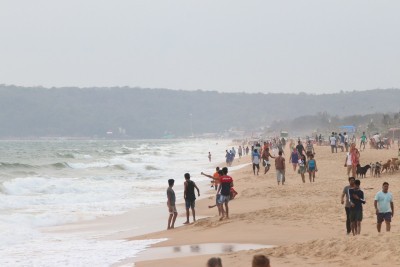
Panaji, Lifeguards are now sharing valuable life-lessons with beachgoers in Goa.
A novel initiative, 'Swim with Lifesafers', introduced recently by Drishti Marine, a private agency tasked with saving lives off Goa's popular beaches, is aimed at educating beachgoers about the wonders as well as the hidden perils of swimming in the sea.
"They took us 50 metres inside the sea. Neither I nor my wife know swimming, but we enjoyed the experience. They have also informed us how to enjoy safely in sea," says Suraj Shukla from Raipur as he stepped out on the beach after his maiden deep sea swim. Shukla is holidaying in Goa with his wife.
The programme begins with a shout-out for volunteers on social media as well as via public announcement calls on beaches which see a high density of visitors like Baga in North Goa and Benaulim in South Goa districts.
"Once we get around 15-20 visitors, we give them an in-house developed safety floatation device. The free initiative is geared towards orienting oneself to swim further into the water and enjoy it," Divya Sharma, head of Brand and Culture, Drishti Marine, told IANS.
Those signing up for the programme are also made to sign indemnity forms, even as they learn about the nature of waves to expect while swimming, and are briefed about tides, waves, currents and rip currents.
"So globally rip currents are a very high statistic for drowning deaths. It is difficult for people to realise that there is a rip current in the water or they are (caught) in one. We wanted to find a way to help this," Sharma said.
"We felt that if the team were able to show people how to spot the dangers and safely get into the sea, they would be able to enjoy their trip in the waters. We want that. Our job is to make people safe, but also to be able to make people enjoy their beach trip. We also felt that swimmers and beachgoers would become safe swimmers and begin to understand the lifesavers and role of lifesavers in the sea through this module," she also said.
Rip currents and drinking under the influence of alcohol are two of the major reasons for drownings among sea-swimmers. While according to Sharma, swimming under the influence of alcohol is as dangerous as drunk driving, which lulls one's senses and the mars the ability to react appropriately to emergency situations, rip currents are equally tricky.
"Rip currents are very deceptive. The rip actually looks like the calmest part of the water, because it occurs between two breaking waves. When two breaking waves have a gap in between, that is the water which is pulled backwards. That is the most dangerous. But people who do not know this, think that is the calmest part of the water. They end up going there, without realising that they have put themselves in danger," Sharma explained.
Though popular, Goa's beaches witnessed a slew of drowning in the mid to late 2000s, years which witnessed meteoric growth in tourist footfalls.
Through 2006-2008, 228 drownings were officially reported along Goa's coastline, many of them victims of tricky rip currents and swimming under the influence of alcohol.
The number dropped considerably a decade later, after efforts to streamline beach safety mechanisms and appointment of a private agency to manage lifeguard operations. A decade later in the four years between 2016-2019, 127 drownings were reported, according to statistics tabled in the state assembly recently.
Drunken swimming, another cause for significant fatalities, is a challenge in itself for lifeguards Sharma says. While drinking invariably lowers one's guard and impairs reactions, inebriation also fuels arguments and fights between beachgoers and lifeguards.
"The issue is, that time (after drinking) they are argumentative and refuse to listen. The whole group is in a Goa party mode. It is difficult. We have seen many times that people who refuse to listen to cautions by lifeguards have to be rescued when they are about to drown," Sharma said.


.jpeg)

